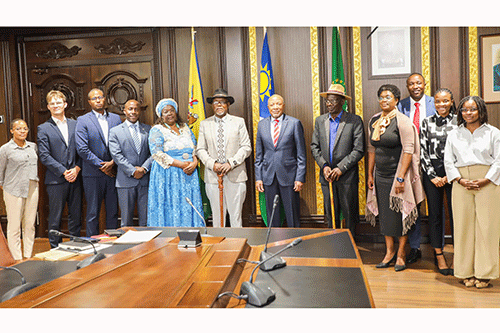The juggernaut that Namibia’s green hydrogen industry has been touted is moving closer to fruition after one of the four pilot projects, the Daures Green Hydrogen Village (DGHV) nears the end of its pilot phase. President Nangolo Mbumba on Monday received a courtesy visit from DGHV representatives, along with Chief of the Daure Daman Traditional Authority Zacharias Seibeb and his delegation.
The purpose of the meeting was to brief and update President Mbumba on the progress made on the project.
Jerome Namaseb, the DGHV consortium CEO, said construction of phase one, which is expected to produce 18 tonnes of hydrogen, and 100 tonnes of green ammonia is 85% complete, and operations are to commence by July 2024.
Phase one includes the pilot project, which ran from 2022 to 2024; phase 1.5 follows from 2024 to 2027, where green fertiliser production starts; phase two includes regional and international exportation of green ammonia from 2029 to 2032; and phase three beyond 2032 is slated for the international export of green ammonia.
The Daures Green Hydrogen Consortium last year secured a N$220 million grant from the German Federal Ministry of Education and Research to implement a Daures Green Hydrogen Village project.
The project is expected to integrate application technologies for the utilisation of green hydrogen in agriculture, ammonia nitrate and cleaning detergents as well as fuel cell-operated centre pivots, boreholes and houses.
Speaking at State House on Monday, Namaseb said DGHV will be Africa’s first net zero village.
Surrounded by presidential advisors and the minister in the presidency, Mbumba pleaded with the green hydrogen village delegation to ensure all stakeholders pull in the same direction.
“We cannot build the country if we are divided. Nobody should be left behind. Unless we work together, we are not going to win big. This applies to all, from government, traditional authorities and the investors to the community. I am ready to visit the area to discuss other areas like poverty, water and drought issues. This is our project; we have come this far. We cannot look behind, so let us protect it with fairness,” said President Mbumba. At the same occasion, green hydrogen commissioner James Mnyupe said it is now time for government to see how it can assist to make sure the project flourishes.
“This is one of the advanced pilot projects currently. The project is almost coming to the end of its pilot phase, and it is now looking for substantial investors to look at the feasibility of entering the industrial-scale project. It is now time for the Namibian government to see how to hold hands to get the project to the industrial stage, and link to our sectors to increase the yield in agriculture, using fertilisers from the project,” said Mnyupe.
Delivering his statement, Chief Seibeb said during the many consultations, the local community was excited about this new development, which they foresee to bring about infrastructure and job opportunities.
He noted his aim is to ensure there is an improvement in the living conditions of the people he is representing.
“I want to ensure that those people living in the area will not be left with the same hardships as they are now experiencing. I had put my hand in darkness for my community because green hydrogen was not known to myself, but the little I heard was not a risk or threat to the environment and the communities,” the chief noted.
Chief Seibeb was, however, concerned with the fact that there is no mention of training for youth in rural areas. This, he said, makes him think rural youth could be left behind or excluded during the commencement of the project.
Another challenge, is benefit-sharing. The chief clarified that he is not against sharing jobs with neighbours from other traditional authorities. “But, to be told that this is a national project, and other traditional authorities will interfere and benefit equally as partners is very disappointing, because there are other projects in other traditional authorities from which my people don’t benefit”.
Last year, Erongo regional governor Neville Andre pinned his hopes on green hydrogen projects to address poverty, unemployment, housing and social challenges.
At the time, he said the Daures project has the potential to transform not only the regional economy, but could even result in rural communities in the Daures constituency becoming shareholders of the project.


